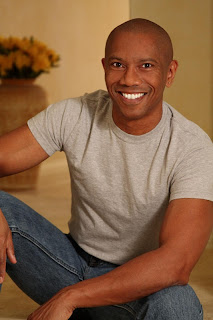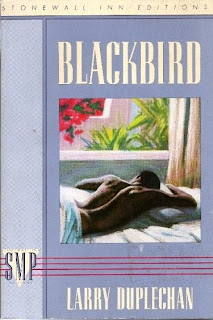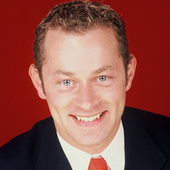 Arts & Books: 'Blackbird' author dispels myths
Arts & Books: 'Blackbird' author dispels myths
One of the perks of living in Southern California is the opportunity to meet amazingly talented people whose work I've admired and enjoyed. After moving to Palm Springs about three years ago I looked up novelist Larry Duplechan.
I had read Larry's novel "Blackbird" when I was in college. The story of Johnnie Ray Rousseau, a black gay teen, was unlike any other I had read. I was enthralled and devoured three of Larry's other books: "Tangled Up In Blue," "Captain Swing" and "Got ‘Til It's Gone." (Larry won a 2009 Lambda Literary Award in the Gay Romance category for the latter.)
I found Larry through Facebook last year. It turns out, he lives in L.A. We e-mailed back and forth a couple of times, then he mentioned he planned to spend the Fourth of July in Palm Springs.
Our meeting in the desert city didn't happen as expected. While dancing at a local hangout that holiday weekend, I noticed this attractive, energetic couple tearing up the dance floor only three feet away. One of the guys looked like Larry's Facebook photo, so I introduced myself. That's right, I finally met Larry Duplechan on the dance floor in Palm Springs - where else, right?
He definitely has some good moves, but like his characters, Larry isn't one to dance around an issue or the point he wants to make. Here, he tells THE WILL DEAN SHOW about the realities of being a published author, which writers inspire him and why the gay "community" just may be a myth.
WDS: "Blackbird" was the first book I read where I thought and probably said aloud, "That's me. He's writing about me." I hadn't read a coming-of-age story about a young, black gay man before. You were doing it before E. Lynn Harris. How did the idea for the book come about? LD: "Blackbird" is my story - it's very much based on my senior year in high school, with a few events from my freshman year at UCLA, in the bargain. I was in my mid-20s when I started writing "Blackbird"; and at that time, I didn't know of any writers who were "writing about me." So I wrote about me.
 |
| Larry Duplechan, author |


I imagine it was something new for the publishing world to consider. Was there immediate interest in publishing "Blackbird" or did it take awhile to find a home for it? St. Martin's Press was my dream publisher. They were the only big-time New York publishing house I knew of that was publishing respectable (non-porn) gay fiction, and I wanted them to publish me. I'd sent my first novel, "Eight Days A Week," to them; and I'd gotten a very nice rejection letter from Michael Denneny, a senior editor there, who was pretty much personally responsible for seeing that gay fiction got published at St. Martin's.
Anyway, he rejected "Eight Days A Week," but he recommended I send it to Alyson Publications Inc. (a tiny, one-man-shop of a gay publishing house out of Boston), which did publish "Eight Days." And now I had an actual name at St. Martin's to send my second book to. Which I did, about a year later - thinking Michael would remember me from "Eight Days," which he did not. But he did agree to publish my second novel, which was "Blackbird." So, I'm happy to admit that it was really very easy getting "Blackbird" published.
Tell me about your writing process. Do you write every day or do you wait for an inspiring character, question or storyline to come to you before starting? I wrote "Tangled Up in Blue" immediately after "Blackbird." I figured, hey, I'm in with a major New York publishing house, I best keep writing. I'd written two novels starring Johnnie Ray Rousseau, my literary alter-ego, and decided to try something entirely different. So the main characters of "Tangled Up" are a white, straight couple and their white, gay best friend, who contracts HIV - though I don't even think it was called HIV yet; the story takes place in 1985.
Well, "Tangled" got the worst reviews of my career - perhaps of anyone's career, ever. And I got my feelings hurt and didn't write anything longer than a shopping list for over a year. And then I got the idea for "Captain Swing," and started writing it in secret, because I'd told my husband and all my friends that I was never going to write again. My husband didn't know I was writing a book until I'd finished it.
"Captain Swing" received the best reviews of my career, but it didn't sell many books. So I said "F--- this," and didn't write another novel for 15 years. I mean, I wasn't making any money, I wasn't famous - still not. So, I found other things to do with that time.
I wrote my fifth (and most recent) novel, "Got 'Til It's Gone," because Don Weise, currently at the helm of Alyson, but then at Carroll & Graff, approached me (via e-mail) and said, "Hey, I'm a big fan of your work, and if you're writing anything, I'd love to publish you." So I wrote that book for Don Weise. And by the time I finished it, Carroll & Graff had been closed, Don Weise was suddenly between jobs, and couldn't publish me. So, I approached Arsenal Pulp Press, which had published the 20th Anniversary Edition of "Blackbird," which did publish "Got 'Til It's Gone."
So basically, I write when I think there's a good reason to write. It's not like the world is clamoring for another Larry Duplechan novel, right? Even when I'm in the midst of writing a book, I don't always have the luxury of writing every day; I'm a legal secretary for a living, and some work days just aren't conducive to writing.
When it comes to fiction about black, gay characters there are certainly more options for readers to choose from since when you started. Is there anyone new whose writing excites you? Despite writing it occasionally, I don't read much fiction, much less gay fiction or black gay fiction. I read a good deal more of it 25 years ago, when I thought I was going to have a career writing it, to keep abreast of the competition. But I've always preferred reading histories and biographies, and more recently theology.
I read more gay fiction earlier this year than I had since the early 1990s, because I was a judge for the Lambda Literary Awards. But it was in the Gay Romance category. And I read 12 novels, one after the other, none of which had one black character.
The last black gay novel I read was "Perfect Peace," by Daniel Black, which I read in manuscript late last year when Daniel asked me to blurb the book. It's a wonderful book - I recommend it highly.
There's still a great deal of talk, especially during the time of Pride festivals, about the lack of inclusiveness for black gay men and lesbians in the broader gay community. Do you find this to be the case -- and if so, should you as a writer/artist have a part in changing it? I don't believe in the "gay community." There's no such animal. A lot of gay people will vote as a bloc when we think it suits our purposes, but that does not a community make. Neither does a city block with a lot of gay bars on it. The notion of a "gay community" will likely always be something of a bad joke, as long as gay people can choose not to come out. The closet and the down-low render the "gay community" a practical impossibility.
What passes for a "gay community" - and I include Gay Pride festivals in this - is largely a white men's club designed as a vehicle for white gay men to find one another and get laid. I've looked at this from both sides now, being a black man married to a handsome white man for his entire adult life. Not to go all Lena Horne on you, but being with a handsome white man opens doors in this world, gay and otherwise. Back in the day, when black gay men were kvetching about being kept out of white gay nightclubs - I'd never had that happen to me, because I was always with my husband. And believe me, if you got turned away from Studio One back in 1977 for wearing a hat, not to worry - you didn't miss a god-damn thing.
So, I'm not sure what we as black gay people think we're being excluded from.
Who are your writing idols -- those folks, living or dead, you look to as being exceptionally gifted? When I first started writing, back in the mid-1980s, my big idol was Tom Robbins. I thought "Even Cowgirls Get the Blues" was the cleverest thing I'd ever seen. I have a BA in English, so I knew how to write a proper sentence. But from Tom Robbins, I learned that once you know the rules, you can break them all if you want to. You can write a one-word sentence, even a one-word chapter. But as a result of my Tom Robbins fixation, "Eight Days A Week" is a bit too clever for its own good.
But I don't really have idols anymore. My favorite novel is probably "Just Above My Head," by James Baldwin, which I re-read every few years. I never get tired of it. And there are novels that make me ashamed to call myself a writer: "East of Eden," by John Steinbeck. "At Swim, Two Boys," by Jamie O'Neill. I should live to write a book that good. What's next for Larry Duplechan, the writer? Well, having published a novel semi-recently, and winning the Lambda Award, a few people have asked me to write short non-fiction essays for various anthologies, some of which are out, some yet to come. Frankly, I much prefer writing essays, but there's no money in it.
Currently I'm doing a little editing/ghost writing gig for a (white, straight) man who's writing a memoir about his days as Scoutmaster for an all-black Boy Scout troop in the ghetto in L.A. back in the 1960s. If and when he sells the book, I don't imagine my name will even be on it. But it's a paying gig.
How is being a published writer different from what you thought it would be before the first book? Well, for one thing, I mistakenly believed I'd make money at it. But I've probably made $20,000 over my entire career as a novelist. I also thought I'd become famous; but I recently spoke to a gay men's book club here in L.A. - a dozen literate, intelligent, urban black gay men between their 30s and 60s, and only one of them had ever heard of me. Makes a fellow wonder if maybe I should have done something else with that time. But every now and then, someone will say to me, "'Blackbird' was the first book I read where I thought and probably said aloud, That's me. He's writing about me."
ABOUT THE AUTHOR Name: Larry Duplechan (Lawrence Duplechan Jr. on my birth certificate) Age: 53 City of residence: Woodland Hills (a suburb of Los Angeles) Relationship status: Married (in California, anyway) since August 2008. Coupled since 1976. Favorite place to read: In a big, comfortable black leather chair in my living room. At present, mostly e-books, on my iPad.
IS THERE A GAY COMMUNITY? Larry made an interesting point about the gay community being a "practical impossibility." Does such a community exist, and if so, do you consider yourself a part of it?

Comments(0)